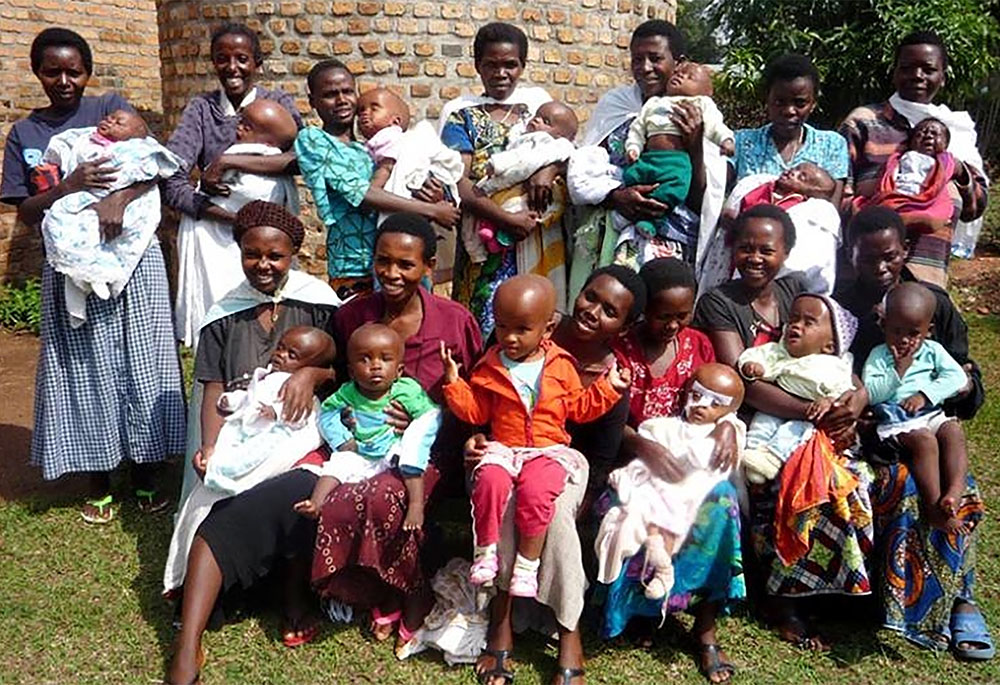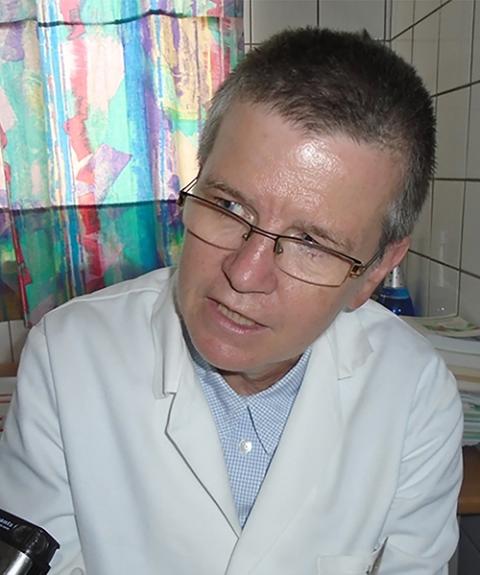
Gikonko Health Center, which the Sisters of St. Boniface run, has developed a cost-effective pediatric treatment program for hydrocephalus, a disease that mostly affects children. (GSR photo/Aimable Twahirwa)
In early 2019, Francine Kanakuze took her 2-year-old son to the University Teaching Hospital of Butare in Huye district in southern Rwanda. There, she was charged roughly US$450 for appropriate treatment — about a month's salary in Rwanda.
The young mother of three said her son's disease emerged years earlier with an acute fever. At the time, she did not rush him to the hospital because traditional healers in her native village in Gisagara district encouraged her to rely on medicinal herbs, making her believe that her son was possessed with demons.
Little did Kanakuze know that her son was born with hydrocephalus, a condition in which excess cerebral spinal fluid builds up within the fluid-containing cavities or ventricles of the brain.
"In the past, I didn't have the knowledge about the disease and could not take my son to a hospital for medical attention," she told Global Sisters Report.
While relying on herbal medicine, the size of her son's head increased abnormally as his health deteriorated, ultimately leading her to take him to the hospital in grave condition, where he continued to experience nausea, vomiting and fever.
A doctor advised Kanakuze to consult Gikonko Health Center, which the sisters of the Secular Institute St. Boniface run in the remote rural village in the Gisagara district of southern Rwanda.
Since its establishment, the center has been receiving patients every year from across Rwanda, seeking specialized treatment for hydrocephalus.
Thanks to Uta Elisabeth Düll, a German physician and a member of the Secular Institute St. Boniface, patients are given a new chance at life with the surgical placement of a shunt that drains brain water into the abdominal cavity.
Founded in 1974, Gikonko is the only health center in Rwanda with facilities to treat hydrocephalus. University Teaching Hospital of Kigali also treats the medical condition, though they typically refer patients to Gikonko where specialists are based. (Düll, the director of Gikonko Health Center, said the hospital mainly provides preventative care.)
Had Kanakuze known about the treatment that the Sisters of St. Boniface provide, they could've saved her son's life for about a dollar.
Düll said in an interview with GSR, "We are aware that most people can't afford the exorbitant medical bills, so we have partnerships with the manufacturers whereby they donate the wire, and we also distribute them for free."
In addition to expertise in treating hydrocephalus, the medical team also provides rehabilitation and extra daily care for those who have the disease, which mostly affects children in Rwanda.
Studies show a troubling trend in which East Africa experiences more than 6,000 new cases of infant hydrocephalus per year. Because neonatal infection causes the majority of cases, the researchers note, the disease should be preventable.
With one neurosurgeon for every 10 million people in East Africa, however, initial treatment for hydrocephalus remains elusive for most.
Hydrocephalus is considered among the most expensive diseases to treat in Rwanda, inspiring the Sisters of St. Boniface to provide treatment free of charge to children from vulnerable families, with the exception of a small copayment.
Currently, the health facility receives 70-80 patients on a weekly basis from across the country. Although the number of patients is high for its limited staff, the health center has managed to stand out with its treatment of certain cancers, cleft lips and cleft palates, and hydrocephalus.
Advertisement
For patients with hydrocephalus, the excess fluid causes the brain's ventricles to expand, risking damage to the brain through the added pressure. If left untreated, the condition can be fatal, according to health experts.
Emmy Agabe Nkusi, a senior consultant neurosurgeon at King Faisal Hospital in Kigali, said the exact cause of hydrocephalus is unknown, but a pregnant woman's lifestyle may cause the disease. In the first trimester, if a pregnant woman does not consume enough iron and the right nutrients, for example, the child may be affected. In routine prenatal examinations, Nkusi said, brain imaging and ultrasound tests can help detect hydrocephalus before birth.
Claude Ganza is set to return to nursery school after six months of successful hydrocephalus treatments. The 3-year-old son comes from a family that depends on subsistence farming in the southern Nyanza district.
Ganza is among hundreds of children benefiting from the Sisters of St. Boniface's initiative for free hydrocephalus treatment. His mother said the sisters' awareness campaign around this disease led to early diagnosis and improved treatment for middle-class families from these remote rural areas.
After being examined, Ganza was given an appointment to undergo surgery after his mother received information about free treatment from a health facility in her village.
"My son has suffered from this mysterious disease for the last five years," she said. "This has been affecting our daily activities because of this pain, so I have come here for appropriate treatment."
St. Boniface Sr. Jacqueline Mukanzigiye told GSR that a vocation to bring health and well-being services closer to vulnerable communities motivated the congregation to innovate with new treatments for children with hydrocephalus.
"We are serving as a religious congregation," she said. "We are doctors and midwives, and we embrace our congregation's core values, which shape and equip us to discern and respond to the community's needs."









